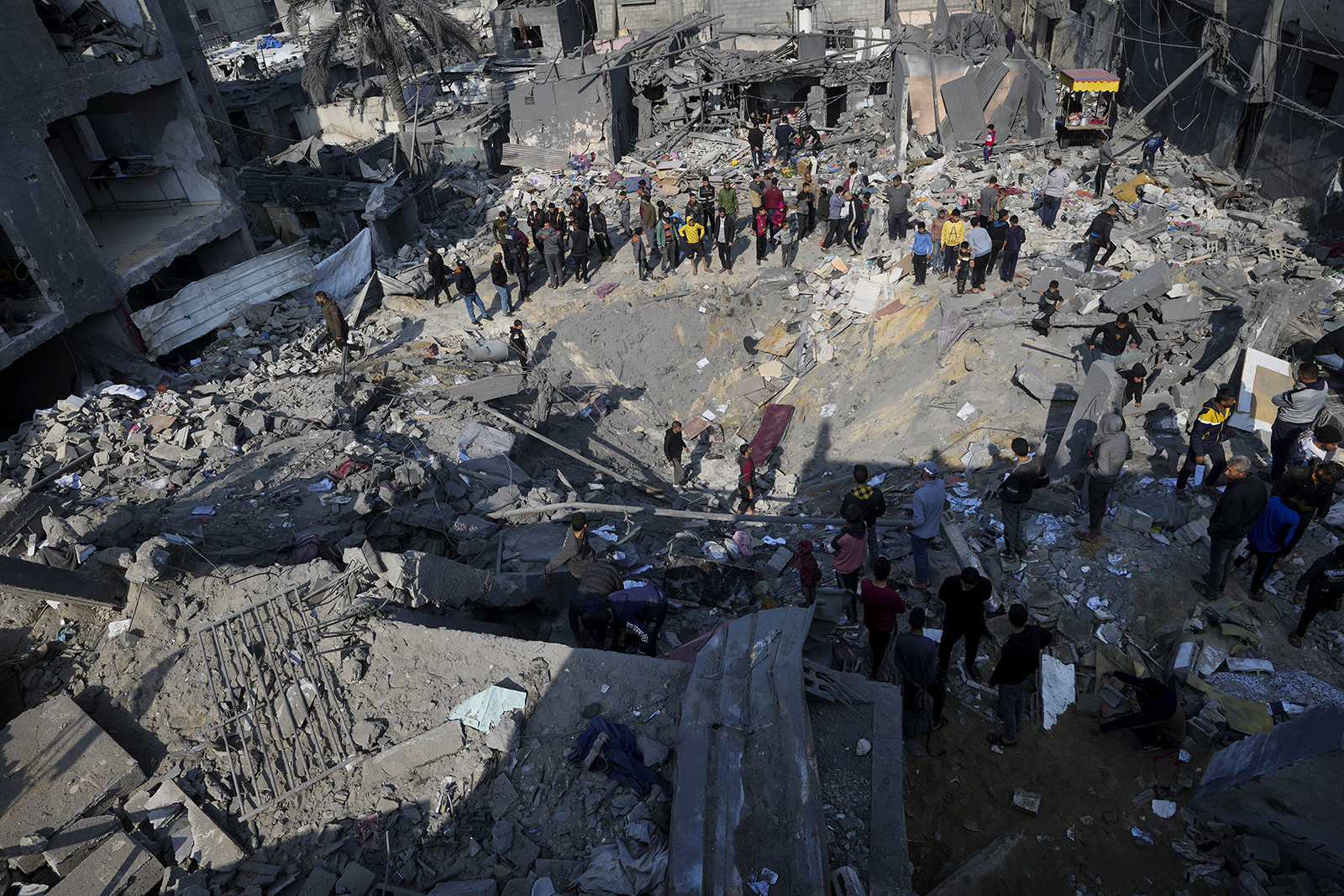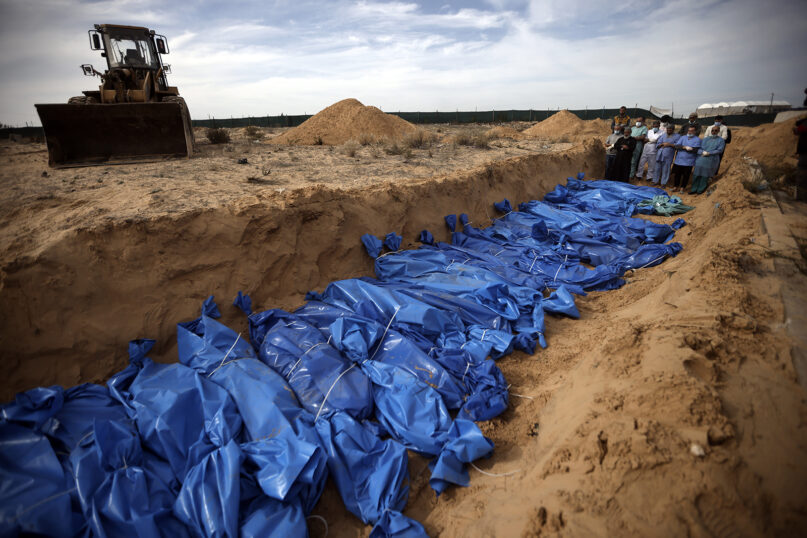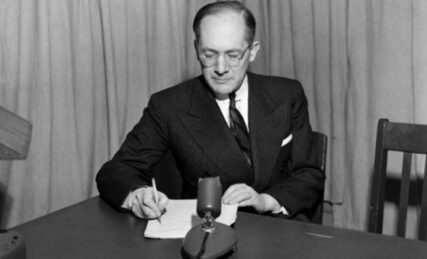(RNS) — Though the word has been applied over the decades to mass killings of Rwandans, Bosnians and Cambodians, the word “genocide,” coined by a Jewish lawyer after World War II, is still nearly synonymous with the destruction of European Jewry during the Holocaust.
Now, in a remarkable twist of history, the Jewish state is being accused of the crime.
On Thursday (Jan. 11), the International Court of Justice in The Hague will begin considering a complaint filed by South Africa that accuses Israel of genocide in its war against Hamas in the Gaza Strip. More immediately, the complaint asks the court to issue a provisional measure to halt the fighting in Gaza, where more than 23,000 Palestinians have been killed and millions displaced.
The South African filing says that Israel has attempted to eradicate the Palestinian people in Gaza by creating “conditions of life calculated to bring about their physical destruction.”
Raphael Lemkin, a Polish Jewish lawyer who fled to the United States in 1942, lost most of his family, including his parents, in the Holocaust, in which at least 6 million Jews died. Lemkin became determined that international law recognize and outlaw the systematic destruction of any national, ethnic, racial or religious group.
The crime needed a name, and Lemkin furnished one by combining geno — from the Greek word for race or tribe — with cide, from the Latin word for killing.
Thanks to his efforts, the United Nations in 1948 approved the Convention on the Prevention and Punishment of Genocide. A total of 153 countries (out of 195 in the world) have since signed onto the genocide convention, committing them to “undertake to prevent and punish” genocide. Israel signed the convention in 1951; South Africa in 1998.
Israel has vehemently denied that it has engaged in genocide, saying its battle in the Gaza Strip is against the terrorist group Hamas, not the Palestinians themselves. It has dispatched Aharon Barak, an esteemed retired justice of Israel’s Supreme Court and — no less ironically — a survivor of the genocide of European Jews, to defend against the charge.
“There’s nothing more atrocious and preposterous than this claim,” President Isaac Herzog of Israel said on Tuesday, pointing out that the Hamas’ 1988 charter calls for the elimination of Israel.
Here are a few keys to the impact of the hearing and its possible outcomes:
What authority does the International Court of Justice have?
The ICJ, founded in 1945 as part of the U.N. charter, adjudicates questions of international law among states.
In 1986, Nicaragua brought a case to the ICJ claiming the U.S. had violated international law by supporting the Contras in their rebellion against the Sandinistas. The court agreed. Last year, Ukraine alleged that Russia abused the genocide convention to justify launching its invasion there. The case is still pending but as a provisional measure the ICJ asked Russia to suspend its military operations.
It also hears genocide allegations from among states that have signed the genocide convention.
While South Africa is not being attacked or suffering directly from Israel’s prosecution of the Hamas war, its complaint is based on the U.N. treaty.
“South Africa is claiming standing based on the fact that both Israel and South Africa are parties to the 1948 genocide convention,” said Thomas Kelley, a professor of law at the University of North Carolina Chapel Hill who teaches international law.
Who will hear the case and how long will it take?
The ICJ is composed of 15 judges, each representing a different country. In this case, it has added two more: a South African judge and an Israeli judge.
Typically, the ICJ takes years to rule on a claim of genocide, but South Africa has asked for an emergency order for Israel to immediately halt its military operation as a first step. No one seems to know whether the ICJ would issue such an order promptly. Oral arguments are scheduled for Thursday and Friday.

Palestinians look at the destruction of the Al-Gatshan family building after an Israeli strike in Nusseirat refugee camp, central Gaza Strip, on Dec. 18, 2023. Satellite data shows that one-third of structures across Gaza have been destroyed. (AP Photo/Adel Hana, File)
How do you prove genocide?
In cases alleging abuse of the genocide convention, the court looks at material evidence of killings or forced transfer of a group. In addition, a finding of genocide must establish an intent to destroy a group of people.
In its 84-page application to the ICJ, South Africa cited statements by Israeli officials that South Africa says “constitute clear direct and public incitement to genocide.”
Israeli officials, including Prime Minister Benjamin Netanyahu and Defense Minister Yoav Gallant, have made public comments that could suggest genocidal intent. Announcing the siege of Gaza after Hamas’ invasion of Israel that killed 1,200 people, Gallant was quoted saying, “We are fighting against human animals.” Some of the Israeli officials’ statements cited in South Africa’s complaint that call for removal of Palestinians, the flattening of Gaza or the dehumanization of Palestinians may count as evidence of intent.
“Israel will argue is that these statements don’t actually translate into policy,” said Omer Bartov, a professor of Holocaust and genocide studies at Brown University.
How does the ICJ enforce its rulings?
The ICJ does not have any mechanisms for enforcing its rulings. Essentially its judgments are “advisory opinions,” Kelley said.
ICJ judgments can be referred to the U.N. Security Council, which has primary responsibility for the maintenance of international peace and security. But the Security Council, made up of 15 member nations, often deadlocks along the lines of their informal or formal alliances, and its permanent five members — the United States, the United Kingdom, Russia, China and France — can veto resolutions.
In March, the ICJ called on Russia to suspend its military operations in Ukraine, but Russia essentially ignored it.
Do ICJ rulings have any impact?
Judgments by the court can have political and legal implications that may affect a country’s standing and reputation.
Other countries may also be implicated.
For example, Bartov said, the U.S. is a major supplier of weapons to Israel. If the ICJ rules that Israel committed genocide, the U.S. would then technically be in violation of its own laws against providing munitions to countries suspected of breaches of international law.
But the biggest impact of ICJ decisions may be reputational.
“If a country loses credibility on the world stage, it has less influence and it may have economic effect,” Kelley said. “Most countries, outside of maybe North Korea and a few other pariah states, don’t want to be outlaws.”






